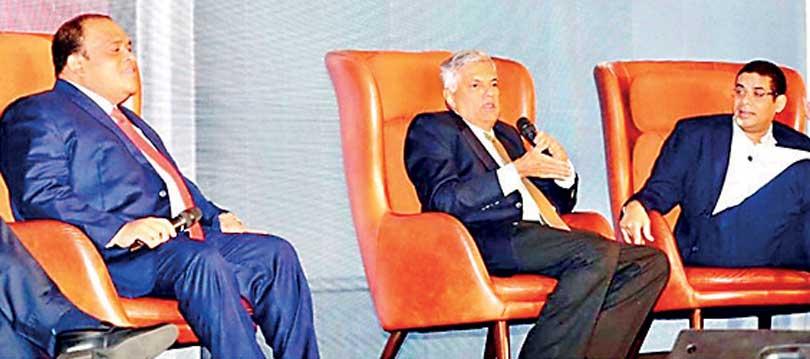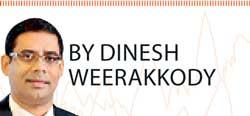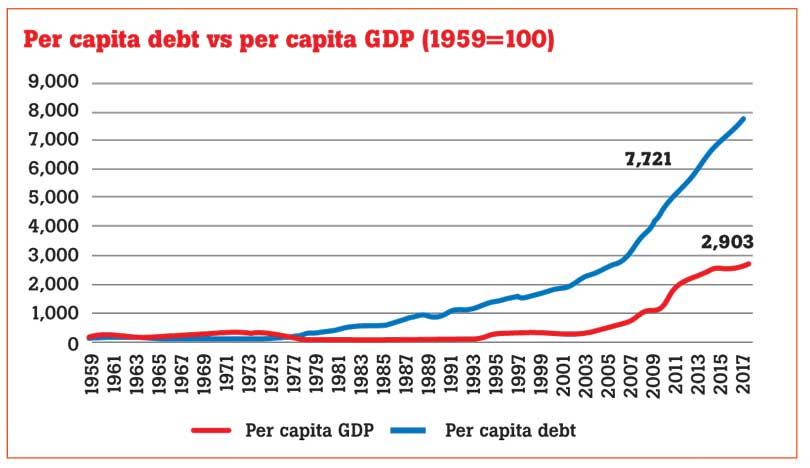Reply To:
Name - Reply Comment

Dammika Perera and Prime Minister Ranil Wickremesinghe in conversation with the writer at Fireside 2019
 Prime Minister Ranil Wickremesinghe and business tycoon Dammika Perera gave their perspectives at the packed Fireside, organised by the Daily FT, International Chamber of Commerce Sri Lanka and CIMA, at The Hilton Colombo, recently, saying Sri Lanka has a complex set of problems, as it is a low-middle-income country with very high debt, an aging population and limited exports and investment.
Prime Minister Ranil Wickremesinghe and business tycoon Dammika Perera gave their perspectives at the packed Fireside, organised by the Daily FT, International Chamber of Commerce Sri Lanka and CIMA, at The Hilton Colombo, recently, saying Sri Lanka has a complex set of problems, as it is a low-middle-income country with very high debt, an aging population and limited exports and investment.
Sri Lanka is facing a bunching of debt till about 2023. In 2018 alone, the Sri Lankan rupee deprecated by nearly 20 percent. Despite several reforms, the country remains vulnerable to many external and internal shocks.
At the heart of the country’s economic problems is the high deficit and government borrowings. There are various reasons for this. At the heart of all this is the steady decline in the tax-to-GDP ratio from 19 percent in 1989, to 10 percent by 2019, the lack of policy continuity and finally the lack of progress in the SOE reforms. Responding to the questions from the public on some of these challenges faced by Sri Lanka, the prime minister acknowledged that policies necessary for fiscal consolidation had presented several challenges to the private sector.
He also emphasised that the government was working on increasing liquidity and reducing interest rates. The prime minister recapped the economic situation that prevailed when the government came into power in 2015, which warranted a shifting of gears, to prioritise fiscal consolidation. This required increasing public revenue, which necessitated higher taxes.
The prime minister said that Sri Lanka has to make a leap from producing non-tradable goods to a greater portion of tradable goods, which would improve exports and attract investment. Such an effort would improve reserves and strengthen Sri Lanka’s debt repayment capacities as well and set the stage for the country to move out of the low-middle income category it is currently stuck in for the last 10 years.
The prime minister emphasized, “If we do this consciously by 2030, the country will be able to reduce its debt. I’m not saying it will come down to about 35 percent of GDP but it may come to about 60 percent of GDP. Then it is manageable,” he said.
Importance of growth
Vallibel One Group Chairman Dhammika Perera however had a different view. He said Sri Lanka needs to focus on growth that creates jobs and promotes innovation, to move forward from the country’s current middle-income status.
Perera pointed out that it was important to focus policy on how to create jobs, as it was the most tangible method of achieving economic growth. Economic Growth is certainly critical for Sri Lanka to get out of this debt crisis because of the comparatively high amount of debt the country has compared to its peers.
Most other countries of the low-middle-income category have about 55 percent-60 percent debt-to-GDP ratios but Sri Lanka’s is at 80 percent of GDP (see graph). In order to reduce this, the economy has to expand the exports base and investment, rather than doing infrastructure-funded by loans, which was primarily the main avenue of growth in the last 15 years.
Perera pointed out that Sri Lanka’s per capita income, which is about US $ 4,000, only grew by US $ 50 in the last few years. He noted that for Sri Lanka to grow to become a US $ 10,000 or a US $ 12,000 per capita country, to be recognized as a developed country, it would take over 160 years at the present rate.
Therefore, he said Sri Lanka must embrace new technologies, which would open up fresh growth avenues as well as make the existing industries more competitive.
Perera pointed out, “When economy grows, the revenue grows. Everyone has realised that if the economy doesn’t create new jobs, the economy is in big trouble. If the economy is growing, then all other aspects, including debt, income levels and taxation will be easier to manage. For this to happen, we need to have innovation, education, transparency, women participation, reconciliation, better public servants and improve our competitiveness.
Taxation and interest rates
Both the prime minister and Perera agreed that increasing the tax revenue is important for fiscal consolidation and to provide social security needs such as education, healthcare and housing. Such measures required careful consideration.
Even though Sri Lanka’s healthcare and other service will improve, higher taxation retards growth. Unfortunately, for Sri Lanka, the tax base is poor. Taxing the same people can only force them to curtail their operations. Therefore, improving the quality of education, vocational training, controlling corruption and helping SMEs with low-cost funding can boost the economy.

Strategy
Some of the strategies for transitioning from a lower-middle to high-income economy, i.e. to get to US $ 12,000 GDP per capita income, looking at some of the developed countries that have increased their GDP per capita income from US $ 4,000 to US $ 20,000 invested big on higher education, vocational and technical training and primary education more than on hard infrastructure.
The very large income gap, which we currently have, can only be bridged by achieving a much higher rate of equitable GDP growth than now. If we desire to catch up with some of the fastest growing developing countries of the world, we need to invest big in human capital, especially in disadvantaged groups and early childhood education to develop the new skills that are increasingly in demand in the labour market, such as high-order cognitive and socio-behavioural skills.
Also upgrade taxation systems, where needed, to provide fiscal space to finance human capital development and social protection and ensure universal coverage and protection that does not fully depend on having formal wage employment.
We also need to promote reconciliation, environmental sustainability, combat bribery and elect political leaders from middle-income professional families - that is the only way we can prevent the ruffians who abuse each other in filth in the house and rob the country blatantly from getting to Parliament.
(Dinesh Weerakkody is a thought leader)